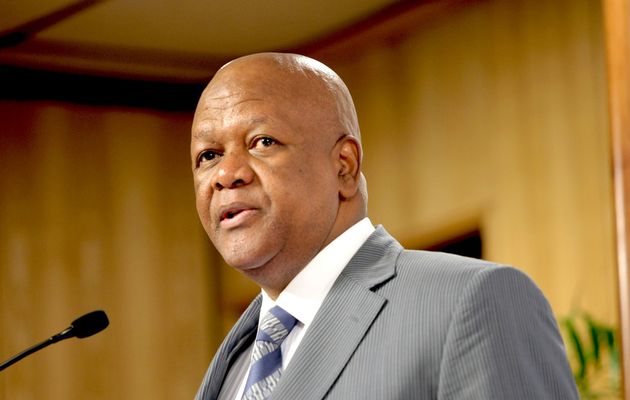
Johannesburg – Johannesburg – Amid a security crackdown with 1 444 intelligence operatives deployed countrywide on Freedom Day, the government on Tuesday said it was tackling the underlying causes of the spate of xenophobic attacks against foreign nationals.
Measures will include ensuring the proper legal registration of spaza shops, tackling lackadaisical municipal by-law enforcement and assisting South Africans to meaningfully enter the economy.
The National Prosecuting Authority has also prioritised prosecutions related to attacks on foreign nationals. It will ask the courts to impose direct jail terms.
As part of Operation Fiela (or “sweep” in Sotho) law enforcement agencies have been deployed countrywide to ensure the restoration of peace and stability.
The inter-departmental operation will rid the country of illegal weapons, drug dens, prostitution rings and other illegal activities, Minister in the Presidency Jeff Radebe said in Pretoria on Tuesday.
He was addressing the media on behalf of the inter-ministerial committee on migration, appointed by President Jacob Zuma to deal with underlying causes of tension between communities and foreign nationals.
“We want to sweep our public places clean so that our people can be and feel safe,” Radebe said. “The SAPS is the lead agency in the operation, supported by provincial and municipal traffic departments. The president has deployed the defence force for specific operations to support the police,” Radebe said.
As part of the operation, 265 suspects have been arrested and charged in 150 cases of public violence around the country and 423 people wanted in connection with crimes traced.
- Chamisa under fire over US$120K donation
- Mavhunga puts DeMbare into Chibuku quarterfinals
- Pension funds bet on Cabora Bassa oilfields
- Councils defy govt fire tender directive
Keep Reading
Special operations were held in Pretoria central and Sunnyside, Hillbrow, Mayfair and Alexandra in Joburg, and several people arrested. Dagga, weapons and suspected stolen property were seized.
Rabebe said seven people – three of them South Africans – died in the xenophobic violence. The other four hailed from Ethiopia, Zimbabwe, Mozambique and Bangladesh. All the killings were in KwaZulu-Natal.
Preliminary investigations revealed the highly-publicised killing of Mozambican national Emmanuel Jossias, also known as Emmanuel Sithole, related to an act of criminality and was not xenophobic, he said.
To ensure speedy prosecutions in attacks on foreign nationals, dedicated courts with magistrates, prosecutors and interpreters have been set up in KwaZulu-Natal, he said.
The SAPS has allocated detectives in all provinces to expedite the investigations. “We are not taking a business as usual approach; we want to ensure the perpetrators of these vile acts are dealt with as speedily as possible,” said Radebe.
He said that government continued to actively support the displaced foreign nationals at shelters and was providing them with trauma counselling, mattresses, food, blankets, dignity packs, baby formula and clothing items.
A special desk has been set up to manage enquiries and complaints from displaced persons at shelters. Pregnant women and the disabled have been referred to secure facilities.
Some foreign nationals had begun to return to their communities, and this was encouraging, said the minister. He urged communities to assist foreigners to reintegrate into communities.
Home Affairs was verifying their status. In cases where documents were lost or stolen during the violence, replacements would be issued. In cases where documentation was not available, the department would capture their details to issue papers to facilitate repatriation.
Radebe said the department was working with foreign missions to facilitate the return of those who were illegally in the country and to ensure smooth repatriation of those wishing to voluntarily return to their home countries.
“We have repatriated 1 997 undocumented people from KwaZulu-Natal and Gauteng. Undocumented persons awaiting repatriation is 1 507,” said Radebe. The repatriated people included 911 Malawians, 316 Mozambicans, 753 Zimbabweans and 17 Tanzanians.
“We are unyielding in our commitment to ensure these shameful attacks never happen again and therefore committed to finding a lasting solution to the problem.
“Migration can only be resolved by taking a holistic approach, including identifying and resolving challenges highlighted by traders.”
It was encouraging that despite the events, Africans from other countries still considered South Africa a safe place to visit, he said.
In March alone, 10 548 people from Ethiopia, Malawi, Mozambique, Tanzania and Zimbabwe visited South Africa, said Radebe.
He added: “We want to reassure those who plan to travel to South Africa… The violence has stopped and we are now working hard to ensure that nobody within the borders of our country is victimised based on their country of origin.”
At Parliament, a detailed picture emerged of the security response to end anti-foreigner violence. SAPS Major-General Charl Annandale, head of specialised operations, said aside from the deployment of 1 444 intelligence operatives, police supported by soldiers have held more than 5 000 patrols.
”We have a target date of mid-May, but things can change and it (could) end earlier,” he replied to a question how long the operations would stay active.
-IOL










